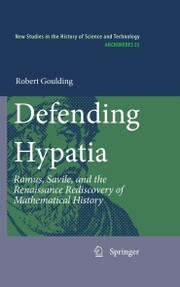-
Zusatztext
-
In1713,PierreRem onddeMontmortwrotetothemathematicianNicolasBernoulli: It would bedesirable if someone wanted totake thetrouble toinstruct how and inwhat order the discoveries in mathematics have come about . . . The histories of painting, of music, of medicine have been written. A good history of mathematics, especially of geometry, would bea much more interesting and useful work . . . Such a work, ifdone well,could be regarded to some extent as a history of the human mind, since it is in this science, more than in anything else, that man makes known that gift of intelligence that God has given him to rise 1 above all other creatures. Ahalf-centurylater,Jean-EtienneMontuclaprovidedsuchanaccountinhisHistoire des mathem atiques ( rst printed in 1758, and reissued in a greatly expanded form 2 in 1799). Montuclas great work is generally acknowledged as the rst genuine history of mathematics. According to modern historians, previous attempts at such a history had amounted to little more than collections of anecdotes, biographies or exhaustive bibliographies: jumbles of names, dates and titles, as one writer in the 3 Dictionary of Scienti c Biography characterizes them. Montucla, in contrast, was thoroughly animated by the Enlightenment project expressed in de Montmorts l- ter. In his Histoire he set out to provide a philosophicalhistory of the development 4 of the human mind, as he himself described it.
-
-
Kurztext
-
Why should mathematics, the purest of sciences, have a history? Medieval mathematicians took little interest in the history of their discipline. Yet in the Renaissance the history of mathematics flourished. This book explores how Renaissance scholars recovered and reconstructed the origins of mathematics by tracing its invention in prehistoric Antiquity, its development by the Greeks, and its transmission to modern Europe via the works of Euclid, Theon and Proclus. The principal architects of this story -- the French philosopher and University of Paris reformer Peter Ramus, and his critic, the young Oxford astronomy lecturer Henry Savile worked out diametrically opposed models for the development of the mathematical arts, models of historical progress and decline which mirrored each scholars larger convictions about the nature of mathematical thinking, the purpose of the modern university, and the potential of the human mind. In their hands, the obscure story of mathematical history became a site of contention over some of the most pressing philosophical and pedagogical debates of the sixteenth century.
-
Detailansicht
Defending Hypatia
eBook - Ramus, Savile, and the Renaissance Rediscovery of Mathematical History, Archimedes
ISBN/EAN: 9789048135424
Umbreit-Nr.: 1836751
Sprache:
Englisch
Umfang: 5 S., 1.80 MB
Format in cm:
Einband:
Keine Angabe
Erschienen am 09.06.2010
Auflage: 1/2010
E-Book
Format: PDF
DRM: Digitales Wasserzeichen


